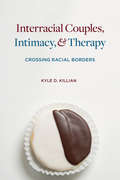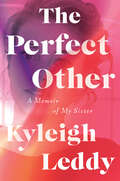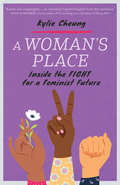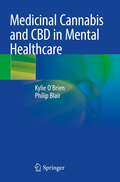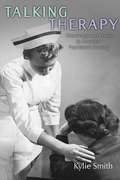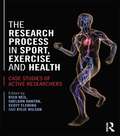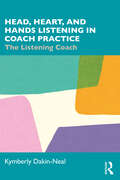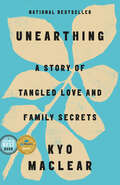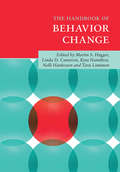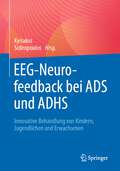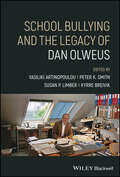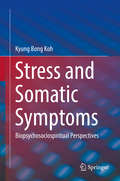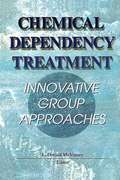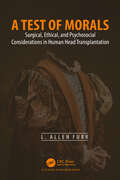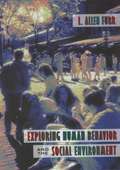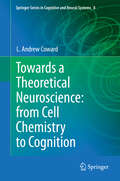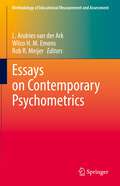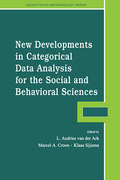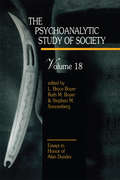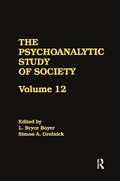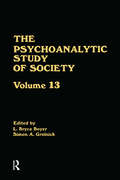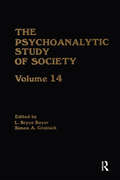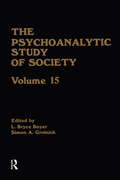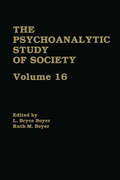- Table View
- List View
Interracial Couples, Intimacy, and Therapy: Crossing Racial Borders
by Kyle KillianGrounded in the personal narratives of twenty interracial couples with multiracial children, this volume uniquely explores interracial couples' encounters with racism and discrimination, partner difference, family identity, and counseling and therapy. It intimately portrays how race, class, and gender shape relationship dynamics and a partner's sense of belonging. Assessment tools and intervention techniques help professionals and scholars work effectively with multiracial families as they negotiate difference, resist familial and societal disapproval, and strive for increased intimacy. The book concludes with a discussion of interracial couples in cinema and literature, the sensationalization of multiracial relations in mass media, and how to further liberalize partner selection across racial borders.
The Perfect Other: A Memoir of My Sister
by Kyleigh LeddyAll Kait Leddy had ever wanted was a little sister. When Kyleigh was born, they were inseparable; Kait would protect her, include her, cuddle and comfort her, and, to Kyleigh, her big sister was her whole world.As they grew, however, and as Kait entered adolescence, her personality began to change. She was lashing out emotionally and physically, and losing touch with reality in certain ways. The family struggled to keep this side of Kait private—at school and in her social life, she was still the gorgeous, effervescent life of the party with a modeling career ahead of her and big dreams. But slowly, things began to shatter, and Kyleigh could only watch in horror as her perfect sibling&’s world collapsed around her. Kait was institutionalized with what would eventually be diagnosed as schizophrenia, leaving Kyleigh and their mother to handle the burden, shame, and guilt alone.Then, in January 2014, Kait disappeared. Though they never found her body, security footage showed her making her way onto a big bridge over a river, where it is presumed that she jumped. Kyleigh is left wondering: What could she have done differently? How could this shining light be gone? And how will she find peace without her sister to guide her way there?
A Woman's Place: Inside the Fight for a Feminist Future
by Kylie CheungA fearless primer to the feminism we need now: tactics for advancing reproductive justice, promoting intersectionality, and pushing back against misogyny, gaslighting, and patriarchal systems of oppression.Too loud. Too shrill. Too far. Too much. Despite the systematic chipping away at our voices, autonomy, and rights, women who demand more--or even just enough--continue to be pushed aside, talked over, and dismissed. From unbridled online abuse to the unspoken societal rules that dictate who can express anger, when you're a feminist the personal is political...and it's time we all embrace feminism as a matter of survival.Cultural critic and Gen-Z feminist Kylie Cheung lays bare the state of affairs for women in the twenty-first century. She discusses the challenges of our time, from misogyny to gaslighting, racism, and rampant attacks on reproductive healthcare. She also explores the empowering strides of #MeToo, unprecedented youth mobilization, and increasing recognition of the power and necessity of intersectional movements. Cheung weaves biting cultural commentary with personal narrative, sharing stories of feminist awakening, online harassment, and the effects of sexual assault, racism, fetishization, and misogyny within relationships. She speaks candidly to a new generation of feminists seeking real, unfiltered experiences and guidance as they navigate the sexist realities of our unjust world. Cheung's manifesto is a tour-de-force of fourth-wave feminism, a call to arms that speaks truth to power as we engage in the fight of and for our lives.
Medicinal Cannabis and CBD in Mental Healthcare
by Kylie O'Brien Philip BlairThis book functions as a clinician’s guide to the use of cannabidiol (CBD) in the treatment of mental health conditions. It conveys the scientific evidence of efficacy of CBD as well as THC and addresses the social stigma attached to its medical use.The book describes the endocannabinoid system, how stress and the endocannabinoid system interact and key constituents, pharmacokinetics and safety aspects of medicinal cannabis, focusing on CBD and THC. Chapters on specific mental health conditions describe the underpinning pathomechanisms including how the endocannabinoid system is involved, and summarises the scientific evidence including animal and human research for the use of CBD and THC in treatment of such conditions. Topics covered include anxiety, depression, post-traumatic stress disorder, insomnia, Alzheimer's Disease and autism spectrum disorder. Chapters also discuss treatment guidelines and case studies. Unique and focused, Medicinal Cannabis and CBD in Mental Healthcare is an invaluable reference for medical practitioners seeking to adopt CBD-use in their treatment plans.
Talking Therapy: Knowledge and Power in American Psychiatric Nursing (Critical Issues in Health and Medicine)
by Kylie SmithTalking Therapy traces the rise of modern psychiatric nursing in the United States from the 1930s to the 1970s. Through an analysis of the relationship between nurses and other mental health professions, with an emphasis on nursing scholarship, this book demonstrates the inherently social construction of ‘mental health’, and highlights the role of nurses in challenging, and complying with, modern approaches to psychiatry. After WWII, heightened cultural and political emphasis on mental health for social stability enabled the development of psychiatric nursing as a distinct knowledge project through which nurses aimed to transform institutional approaches to patient care, and to contribute to health and social science beyond the bedside. Nurses now take for granted the ideas that underpin their relationships with patients, but this book demonstrates that these were ideas not easily won, and that nurses in the past fought hard to make mental health nursing what it is today.
The Research Process in Sport, Exercise and Health: Case Studies of Active Researchers
by Sheldon Hanton Rich Neil Scott Fleming Kylie WilsonWhat are the challenges and potential pitfalls of real research? <P><P> What decision-making process is followed by successful researchers? <P><P> The Research Process in Sport, Exercise and Health fills an important gap in the research methods literature. Conventional research methods textbooks focus on theory and descriptions of hypothetical techniques, while the peer-reviewed research literature is mainly concerned with discussion of data and the significance of results. In this book, a team of successful researchers from across the full range of sub-disciplines in sport, exercise and health discuss real pieces of research, describing the processes they went through, the decisions that they made, the problems they encountered and the things they would have done differently. As a result, the book goes further than any other in bringing the research process to life, helping students identify potential issues and problems with their own research right at the beginning of the process.<P><P> The book covers the whole span of the research process, including: identifying the research problem justifying the research question choosing an appropriate method data collection and analysis identifying a study’s contribution to knowledge and/or applied practice disseminating results. <P><P> Featuring real-world studies from sport psychology, biomechanics, sports coaching, ethics in sport, sports marketing, health studies, sport sociology, performance analysis, and strength and conditioning, the book is an essential companion for research methods courses or dissertations on any sport or exercise degree programme.
Head, Heart, and Hands Listening in Coach Practice: The Listening Coach
by Kymberly Dakin-NealThis book is an exploration of intentional listening as an essential skill for coaches. It introduces the Head, Heart, and Hands Listening model as a vital tool to amplify effective listening in coaching practice. Accessible and applicable, the book explores the three listening modalities of Head, Heart, and Hands as active, though largely unconscious, lenses that inform the potency of our listening. Dakin-Neal argues that once coaches identify "how" they listen, they can assist their clients in more targeted ways to positively impact their personal and professional lives. Chapters are divided into the three listening modalities, Head, Heart, and Hands, and are filled with case studies, stories, reflective questions, and exercises from the author’s experience to help coaches strengthen their listening skills. The book also includes a comprehensive listening assessment for coaches to use in practice. This book is essential reading for coaches in practice and in training as well as organizational psychologists, HR professionals, and those working within corporations.
Unearthing: A Story of Tangled Love and Family Secrets
by Kyo MaclearWINNER OF THE 2023 GOVERNOR GENERAL'S LITERARY AWARD FOR NONFICTIONFor readers of Crying in H Mart and Wintering, an unforgettable memoir about a family secret revealed by a DNA test, the lessons learned in its aftermath, and the indelible power of love.Three months after Kyo Maclear&’s father dies in December 2018, she gets the results of a DNA test showing that she and the father who raised her are not biologically related. Suddenly Maclear becomes a detective in her own life, unravelling a family mystery piece by piece, and assembling the story of her biological father. Along the way, larger questions arise: what exactly is kinship? And what does it mean to be a family? Thoughtful in its reflections on race and lineage, unflinching in its insights on grief and loyalty, Unearthing is a captivating and propulsive story of inheritance that goes beyond heredity. What gets planted, and what gets buried? What role does storytelling play in unearthing the past and making sense of a life? Can the humble act of tending a garden provide common ground for an inquisitive daughter and her complicated mother? As it seeks to answer these questions, Unearthing bursts with the very love it seeks to understand.
The Handbook of Behavior Change (Cambridge Handbooks in Psychology)
by Linda D. Cameron Martin S. Hagger Kyra Hamilton Nelli Hankonen Taru LintunenSocial problems in many domains including health, education, social relationships, and the workplace have their origins in human behavior. The documented links between behavior and social problems has compelled governments and organizations to explore ways to effectively intervene to promote adaptive behavior change. The Handbook of Behavior Change provides comprehensive coverage of contemporary theory, research, and practice on behavior change. It incorporates evidence-based approaches to behavior change with chapters from leading theorists, researchers, and practitioners from multiple disciplines including psychology, sociology, behavioral science, economics, philosophy, and implementation science. It is the go-to resource for researchers, students, practitioners, and policymakers looking for current knowledge on behavior change and guidance on how to develop effective interventions to change behavior in various contexts.
EEG-Neurofeedback bei ADS und ADHS: Innovative Behandlung von Kindern, Jugendlichen und Erwachsenen
by Kyriakos SidiropoulosDas Buch ermöglicht Neurowissenschaftlern, Psychotherapeuten, Kinder- und Jugendärzten und -Psychiatern einen Einstieg in die Behandlung von ADS/ADHS mit der Methode des EEG-Neurofeedbacks. Es hilft zudem Ergotherapeuten, die ADHS-Symptomatik besser zu verstehen und die Besonderheiten des EEG-Signals von Kindern, Jugendlichen und Erwachsenen mit ADS/ADHS leichter zu interpretieren. Detailliert stellen die Autoren alle relevanten EEG-Protokolle vor, die in der Praxis Anwendung finden. Beleuchtet werden sowohl die Stärken als auch die Schwächen dieser Methode.
School Bullying and The Legacy of Dan Olweus
by Peter K. Smith Susan P. Limber Vasiliki Artinopoulou Kyrre BreivikThe intellectual and personal history of the late Dan Olweus, a pioneer in the field of bullying management and prevention School Bullying and the Legacy of Dan Olweus honours the work and legacy of Dan Olweus, a man generally seen as the “founding father” in the field of bullying management and prevention who initiated a shift in how society, educators, parents and professionals handle and keep track of the hostility that some children display. This book explores how Olweus developed the first widely used questionnaire to survey the issue of bullying and victimisation (the Olweus Bullying Questionnaire, or OBQ), was instrumental in designing the first intervention campaign against school bullying in Norway in the 1980s and developed a multi-layered program of intervention, the Olweus Bullying Prevention Program (OBPP), which is used in many countries around the world. This book also provides constructive criticisms of his work, as well as ways to build on his legacy to reduce the impact of bullying on children and young people. Delivering a summative view of his contribution to this research area, School Bullying and the Legacy of Dan Olweus discusses topics including: Olweus' research and practical achievements over three main stages: first in Sweden, then in Norway and then in later years Uses, strengths and limitations of the OBQ and OBPP, the views of Olweus on cyberbullying and his influence in Japan and China The definition of bullying, bias-based bullying and research challenges around the assessment of interventions The view of the school as a complex adaptive system and the contribution of civil society and of laws and policies against bullying Providing an expansive intellectual and personal history of a leader in the field, School Bullying and the Legacy of Dan Olweus is an essential read for all parents, educators, administrators, researchers and professionals seeking to understand and prevent bullying in schools around the world.
Somatization and Psychosomatic Symptoms
by Kyung Bong KohThis book, with contributions emanating from the 21st World Congress of Psychosomatic Medicine held in Seoul in August 2011, presents the latest evidence-based information about the mechanisms, assessment, and management of psychosomatic disorders from a biopsychosociocultural perspective. Somatization is a process characterized by excessive or inappropriate focus on physical symptoms that are medically unexplained. It is highly prevalent in primary care medicine, as somatoform (psychosomatic) disorders tend to be chronic and can cause significant personal suffering and social problems as well as financial burden.
Stress and Somatic Symptoms: Biopsychosociospiritual Perspectives
by Kyung Bong KohThis book focuses on the assessment and treatment of patients with somatic symptoms, based on biopsychosociospiritual model. Specific assessment skills and treatment techniques are required to approach them effectively. A broad spectrum of knowledge about stress is also needed because stress is closely related to the onset and course of disorders with somatic symptoms.This book consists of four parts. Part 1 ‘Stress’ explores stress, vulnerability, and resilience; intermediate mechanisms between stress and illnesses such as psychoendocrinology and psychoimmunology; the measurement of stress; and the relationship between stress and accidents.Part 2 ‘Somatization’ deals with the concept, mechanisms, assessment, and treatment of somatization. In addition, somatic symptom and related disorders in DSM-5 is included. However, the approach to chronic pain is separately added to this part because pain is a major concern for patients with these disorders. Part 3 ‘Specific physical disorders’ mainly deals with common and distressing functional physical disorders as well as major physical disorders. Therapeutic approach for individuals at risk of coronary heart disease is also included.Part 4 ‘Religion, spirituality and psychosomatic medicine’ emphasizes the importance of a biopsychosociospiritual perspective in an approach for patients with somatic symptoms, especially depressed patients with physical diseases and patients with terminal illnesses because of the growing need for spirituality in such patients. This book explores stress and a variety of issues relevant to the assessment and treatment of disorders with somatic symptoms in terms of biopsychosociospiritiual perspectives. It will be of interest to researchers and healthcare practitioners dealing with stress, health and mental health.
Chemical Dependency Treatment: Innovative Group Approaches
by L Donald McvinneyThe most revolutionary, humanistic guide to counteracting chemical dependency on the market, Chemical Dependency Treatment: Innovative Group Approaches presents group models of intervention with substance using and chemically dependent clients across the continuum of care. In it, you’ll find strategies that will help you engineer your own effective group interventions at different stages of the treatment process. Taking into account the ravaging nature of addiction and the rampant spread of AIDS, this book gives you the sensitivity and skills necessary to seek out the earliest possible healing for your beloved family and friends. In Chemical Dependency Treatment, you’ll build upon existing literature on the subject of group work within the chemical dependency field. In doing so, you’ll glean your own individualized expertise from this excellent collection of essays and qualify yourself to orchestrate compassionate and holistic chemical dependency interventions. You’ll get detailed information about: early community-based intervention for injected drug use (IDU) the transition from inpatient to outpatient status for chemically dependent clients psychoeducational help for chemically dependent gays and lesbians strategies for hospital-based early recovery groups for HIV-infected inner-city clients treatment during the early phases of outpatient therapy outpatient group psychotherapy with cluster-B personality disordered men multiple oppression in group psychotherapyIf you know someone who is chemically dependent, or if you’re interested in becoming more informed about what your family or community can do to quell the epidemic of chemical dependency, Chemical Dependency Treatment will put you on the sure pathway to a more caring, more immediate group intervention.
A Test of Morals: Surgical, Ethical, and Psychosocial Considerations in Human Head Transplantation
by L. Allen FurrWhile transplanting human heads is not a new concept, the idea has largely been relegated to religious lore or as a plot device in science fiction. But now, a surgical plan to perform the complex procedure exists, and though most physicians question head transplantation’s medical veracity, bioethicists have challenged the surgery on moral grounds. A Test of Morals compiles and examines the ethical questions that dog those who advocate for conducting this most radical of medical proposals in order to determine if society should move forward and allow head transplantation to occur. Current bioethical principles stand in opposition to head transplantation, causing a conflict of values rarely seen in medicine.
Exploring Human Behavior and the Social Environment
by L. Allen FurrIndividuals' behaviors are a function of their interactions with the bio-psycho-social contexts in which they are situated. Consequently, in this book considerable attention is paid to the various aspects of those environments. Topics such as the effects of social class and community on behavior are given considerable attention. How individuals and groups relate to political and economic systems and bureaucracies are important themes as well.
Towards a Theoretical Neuroscience: from Cell Chemistry to Cognition
by L. Andrew CowardThe book explains how to understand cognition in terms of brain anatomy, physiology and chemistry, using an approach adapted from techniques for understanding complex electronic systems. These techniques create hierarchies of information process based descriptions on different levels of detail, where higher levels contain less information and can therefore describe complete cognitive phenomena, but are more approximate. The nature of the approximations are well understood, and more approximate higher level descriptions can therefore be mapped to more precise detailed descriptions of any part of a phenomenon as required. Cognitive phenomena, the anatomy and connectivity of major brain structures, neuron physiology, and cellular chemistry are reviewed. Various cognitive tasks are described in terms of information processes performed by different major anatomical structures. These higher level descriptions are selectively mapped to more detailed physiological and chemical levels.
Essays on Contemporary Psychometrics (Methodology of Educational Measurement and Assessment)
by L. Andries van der Ark Wilco H. M. Emons Rob R. MeijerThis book 'Essays on Contemporary Psychometrics' provides an overview of contemporary psychometrics, the science devoted to the advancement of quantitative measurement practices in psychology, education and the social sciences. The volume consists of four parts, each having several chapters on cutting-edge work in the field. Part I, General Perspectives on Psychometrics, includes expert views on topics such as psychological models vs. measurement models, using tests in decision making, artificial intelligence, and psychometric network models. Part II, Factor Analysis and Classical Test Theory, the type of psychometrics that is still used most often in the social and behavioral sciences, includes state-of-the-art contributions on test-score reliability, change-score reliability, handling missing data in principal component analysis, test equating, and conditional standard errors of measurement. Part III, Item Response Theory, the leading form of psychometrics in modern educational measurement, includes discussions of sampling from many conditional distributions, transparent score reporting, nonparametric item response theory, and targeted testing. Part IV, New Psychometrics, discusses recently developed ideas beyond classical test theory and item response theory, including topics related to computer adaptive testing, response-time modelling, validity indices, diagnostic classification models, and the sparse latent class model for ordinal measurements.Together, these four parts provide an overview of the current state-of-the-art in psychometrics in educational measurement. They are a valuable source of information for graduate students who (intend to) study psychometrics and need an overview of the field, and for researchers interested in the current developments in the field. Chapters [3], [5], [8], [16] and [19] are available open access under a Creative Commons Attribution 4.0 International License via link.springer.com.
New Developments in Categorical Data Analysis for the Social and Behavioral Sciences (Quantitative Methodology Series)
by L. Andries van der Ark, Marcel A. Croon and Klaas SijtsmaCategorical data are quantified as either nominal variables--distinguishing different groups, for example, based on socio-economic status, education, and political persuasion--or ordinal variables--distinguishing levels of interest, such as the preferred politician or the preferred type of punishment for committing burglary. This new book is a collection of up-to-date studies on modern categorical data analysis methods, emphasizing their application to relevant and interesting data sets.This volume concentrates on latent class analysis and item response theory. These methods use latent variables to explain the relationships among observed categorical variables. Latent class analysis yields the classification of a group of respondents according to their pattern of scores on the categorical variables. This provides insight into the mechanisms producing the data and allows the estimation of factor structures and regression models conditional on the latent class structure. Item response theory leads to the identification of one or more ordinal or interval scales. In psychological and educational testing these scales are used for individual measurement of abilities and personality traits.The focus of this volume is applied. After a method is explained, the potential of the method for analyzing categorical data is illustrated by means of a real data example to show how it can be used effectively for solving a real data problem. These methods are accessible to researchers not trained explicitly in applied statistics. This volume appeals to researchers and advanced students in the social and behavioral sciences, including social, developmental, organizational, clinical and health psychologists, sociologists, educational and marketing researchers, and political scientists. In addition, it is of interest to those who collect data on categorical variables and are faced with the problem of how to analyze such variables--among themselves or in relation to metric variables.
The Psychoanalytic Study of Society, V. 18: Essays in Honor of Alan Dundes
by L. BRYCE BOYER, RUTH M. BOYER AND STEPHEN M. SONNENBERGOpening with a critical appreciation of Alan Dundes (M. Carroll) and Dundes's own cross-cultural study of the cockfight, Volume 18 includes chapters on psychoanalysis and Hindu sexual fantasies (W. Doniger); the modern folk tale "The Boyfriend's Death" (M. Carroll); a gruesome Eskimo bedtime story (R. Boyer); the homosexual implications of Argentinean soccer (M. Suarez-Orozco); and the symbolism of a Malaysian religious festival (E. Fuller).
The Psychoanalytic Study of Society, V. 12: Essays in Honor of George Devereux
by L. BRYCE BOYER; SIMON A. GROLNICKVolume 12 includes chapters on the hermeneutics of structuralism and psychoanalysis (H. van Velzen); prophetic initiation in Israel and Judah (D. Merkur); the cult phenomenon and the paranoid process (W. Meissner); the ego and adaptation (P. Parin); male adolescent initiation rituals (L. Rosen); gender identity in a New Guinea people (E. Foulks); and the film Cabaret (S. Bauer).
The Psychoanalytic Study of Society, V. 13: Essays in Honor of Weston LaBarre
by L. Bryce Boyer Simon A. GrolnickVolume 13 includes chapters on the contributions of Weston LaBarre (B. Kilbourne); Geza Roheim's theory of myth (S. Morales); the origins of Christianity (W. Meissner); myths in Inuit religion (D. Merkur); the psychology of a Sherpa shaman (R. Paul); the psychoanalytic study of urban legends (M. Carroll); and the dogma of technology (H. Stein & R. Hill).
The Psychoanalytic Study of Society, V. 14: Essays in Honor of Paul Parin
by L. Bryce Boyer Simon A. GrolnickVolume 14 includes chapters on the psychoanalysis of political commitment (P. Parin); Jews and homosexuals as strangers (P. Parin); the analogous tasks of the psychoanalyst and the ethnographer (M. Gehrie); cultic elements in early Christianity (W. Meissner); Jewish apocalyptists (D. Merkur); creationist resistance to evolution (R. Graber & L. McWhorter); sacred objects and transitional phenomena in aboriginal Central Australia; and a review of the contributions of Paul Parin (D. Freeman).
The Psychoanalytic Study of Society, V. 15: Essays in Honor of Melford E. Spiro
by L. Bryce Boyer Simon A. GrolnickVolume 15 features Melford Spiro's "Culture and Human Nature" and "The internalization of Burmese Gender Identity" along with an interview of Spiro by B. Kilbourne and S. Bolle. Additional topics include children's fantasy life in Papua New Guinea (F. Poole); a psychoanthropological approach to Kagwahiv food taboos (W. Kracke); an ethnological and Rorschach study of three groups of Australian aborigines (R. Boyer et al.); a consideration of the "trickster" in relation to issues of sublimation and psychosocial development; and a review of Bettelheim's contribution to anthropology (R. Paul).
The Psychoanalytic Study of Society, V. 16: Essays in Honor of A. Irving Hallowell
by L. Bryce Boyer Ruth M. BoyerVolume 16 offers appreciations of A. Irving Hallowell by M. Spiro, R. Fogelson, and E. Bourguignon. Additional topics include Kagwahiv dream beliefs (W. Kracke); experiences of the self in Papua New Guinea (F. Poole); house design and the self in an African culture (R. & S. LeVine); circumcision and biblical narrative (M. Lansky & B. Kilborne); and cultic elements in early Christianity (W. Meissner).
